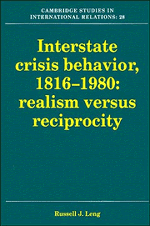Book contents
- Frontmatter
- Contents
- List of figures
- List of tables
- Preface
- 1 REALIST AND PSYCHOLOGICAL PERSPECTIVES
- 2 METHODOLOGY
- 3 THE CRISIS STRUCTURE AND WAR
- 4 PATTERNS OF BEHAVIOR
- 5 STRUCTURE, BEHAVIOR, AND OUTCOMES
- 6 INFLUENCE TACTICS
- 7 INFLUENCE STRATEGIES
- 8 RECIPROCATING INFLUENCE STRATEGIES
- 9 SUMMARY AND CONCLUSION
- EPILOGUE: THE 1990–1991 CRISIS IN THE PERSIAN GULF
- Appendices
- Notes
- References
- Index of names
- Index of subjects
- Titles in the series
7 - INFLUENCE STRATEGIES
Published online by Cambridge University Press: 05 February 2010
- Frontmatter
- Contents
- List of figures
- List of tables
- Preface
- 1 REALIST AND PSYCHOLOGICAL PERSPECTIVES
- 2 METHODOLOGY
- 3 THE CRISIS STRUCTURE AND WAR
- 4 PATTERNS OF BEHAVIOR
- 5 STRUCTURE, BEHAVIOR, AND OUTCOMES
- 6 INFLUENCE TACTICS
- 7 INFLUENCE STRATEGIES
- 8 RECIPROCATING INFLUENCE STRATEGIES
- 9 SUMMARY AND CONCLUSION
- EPILOGUE: THE 1990–1991 CRISIS IN THE PERSIAN GULF
- Appendices
- Notes
- References
- Index of names
- Index of subjects
- Titles in the series
Summary
What constitutes the most effective influence strategy in a militarized crisis? The classical realist prescription is to “demonstrate power” through coercive inducements, albeit within the bounds of a prudential assessment of comparative military capabilities. That prescription is extended to the techniques of crisis bargaining by conflict strategists, who emphasize coercive techniques designed to credibly demonstrate resolve. Realism's critics, on the other hand, have pointed to the dangers associated with undertaking a strategy of escalating coercion, as well as to the possibilities of deescalating the crisis through a series of reciprocated accommodative moves.
Two books published in the early 1960s were particularly influential in setting the course of the debate over these two perspectives. The first was Schelling's Strategy of Conflict (1960), a game theoretic discussion that treated interstate conflicts as games of strategy, in which the object was to win. The second was Osgood's An Alternative to War or Surrender (1962), a proposal for a graduated reduction in US-Soviet tensions (GRIT), which focused on the tendency of disputants to respond to accommodative initiatives in a reciprocating manner. These studies are representative of the ensuing debate between strategic and psychological approaches to understanding interstate conflict, and between realist and reciprocating bargaining prescriptions. Much of the discussion of the conflict strategists' approach to crisis bargaining in the preceding chapters has been drawn from Schelling. In this chapter, we will begin with a closer look at research that has proceeded in a direction closer to that suggested by Osgood, and then proceed to compare the effectiveness of influence strategies based on the different assumptions underlying the two perspectives.
- Type
- Chapter
- Information
- Interstate Crisis Behavior, 1816–1980 , pp. 136 - 163Publisher: Cambridge University PressPrint publication year: 1993



